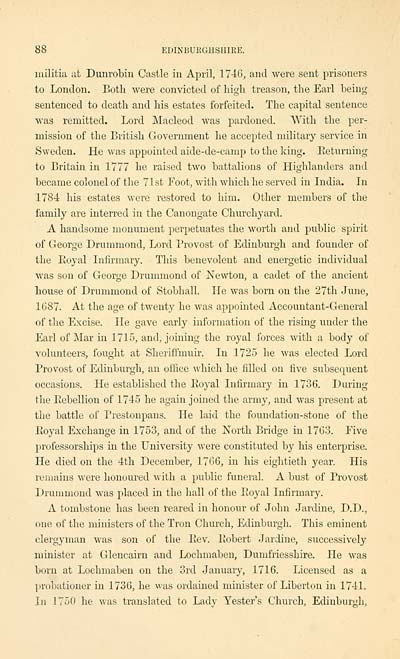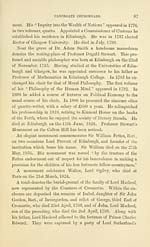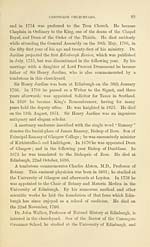Grampian Club > Monuments and monumental inscriptions in Scotland > Volume 1
(112) Page 88
Download files
Complete book:
Individual page:
Thumbnail gallery: Grid view | List view

88 EDINBUEGHSHIRE.
militia at Dunrobin Castle in April, 1746, and were sent prisoners
to London. Both were convicted of high treason, the Earl being-
sentenced to death and his estates forfeited. The capital sentence
was remitted. Lord Macleod was pardoned. With the per-
mission of the British Government he accepted military service in
Sweden. He was appointed aide-de-camp to the king. Eeturning
to Britain in 1777 he raised two battalions of Highlanders and
became colonel of the 71st Foot, with which he served in India. In
1784 his estates were restored to him. Other members of the
family are interred in the Canongate Churchyard.
A handsome monument perpetuates the worth and public spirit
of George Drummond, Lord Provost of Edinburgh and founder of
the Eoyal Infirmary. This benevolent and energetic individual
was son of George Drummond of Newton, a cadet of the ancient
house of Drummond of Stobhall. He was born on the 27th Jime,
1687. At the age of twenty he was appointed Accountant-General
of the Excise. He gave early information of the rising under the
Earl of Mar in 1715, and, joining the royal forces with a body of
volunteers, fought at Sheriffmuir. In 1725 he was elected Lord
Provost of Edinburgh, an office which he fiUed on five subsequent
occasions. He established the Eoyal Infirmary in 1736. During
the Eebellion of 1745 he again joined the army, and was present at
the battle of Prestonpaus. He laid the foundation-stone of the
Eoyal Exchange in 1753, and of the North Bridge in 1763. Five
professorships in the University were constituted by his enterprise.
He died on the 4th December, 1766, in his eightieth year. His
remains were honoured with a public funeral. A bust of Provost
Drummond was placed in the hall of the Eoyal Infirmary.
A tombstone has been reared in honour of John Jardine, D.D.,
one of the ministers of the Tron Church, Edinburgh. This eminent
clergyman was son of the Eev. Eobert Jardine, successively
minister at Glencairn and Lochmaben, Dumfriesshire. He was
born at Lochmaben on the 3rd January, 1716. Licensed as a
probationer in 1736, he was ordained minister of Liberton in 1741.
In 1750 he was translated to Lady Yester's Church, Edinburgh,
militia at Dunrobin Castle in April, 1746, and were sent prisoners
to London. Both were convicted of high treason, the Earl being-
sentenced to death and his estates forfeited. The capital sentence
was remitted. Lord Macleod was pardoned. With the per-
mission of the British Government he accepted military service in
Sweden. He was appointed aide-de-camp to the king. Eeturning
to Britain in 1777 he raised two battalions of Highlanders and
became colonel of the 71st Foot, with which he served in India. In
1784 his estates were restored to him. Other members of the
family are interred in the Canongate Churchyard.
A handsome monument perpetuates the worth and public spirit
of George Drummond, Lord Provost of Edinburgh and founder of
the Eoyal Infirmary. This benevolent and energetic individual
was son of George Drummond of Newton, a cadet of the ancient
house of Drummond of Stobhall. He was born on the 27th Jime,
1687. At the age of twenty he was appointed Accountant-General
of the Excise. He gave early information of the rising under the
Earl of Mar in 1715, and, joining the royal forces with a body of
volunteers, fought at Sheriffmuir. In 1725 he was elected Lord
Provost of Edinburgh, an office which he fiUed on five subsequent
occasions. He established the Eoyal Infirmary in 1736. During
the Eebellion of 1745 he again joined the army, and was present at
the battle of Prestonpaus. He laid the foundation-stone of the
Eoyal Exchange in 1753, and of the North Bridge in 1763. Five
professorships in the University were constituted by his enterprise.
He died on the 4th December, 1766, in his eightieth year. His
remains were honoured with a public funeral. A bust of Provost
Drummond was placed in the hall of the Eoyal Infirmary.
A tombstone has been reared in honour of John Jardine, D.D.,
one of the ministers of the Tron Church, Edinburgh. This eminent
clergyman was son of the Eev. Eobert Jardine, successively
minister at Glencairn and Lochmaben, Dumfriesshire. He was
born at Lochmaben on the 3rd January, 1716. Licensed as a
probationer in 1736, he was ordained minister of Liberton in 1741.
In 1750 he was translated to Lady Yester's Church, Edinburgh,
Set display mode to: Large image | Transcription
Images and transcriptions on this page, including medium image downloads, may be used under the Creative Commons Attribution 4.0 International Licence unless otherwise stated. ![]()
| Publications by Scottish clubs > Grampian Club > Monuments and monumental inscriptions in Scotland > Volume 1 > (112) Page 88 |
|---|
| Permanent URL | https://digital.nls.uk/80691773 |
|---|
| Description | Vol. I. |
|---|---|
| Attribution and copyright: |
|
| Description | Note: Numbers 24-41 are relative to but not part of the Club's series. |
|---|---|

